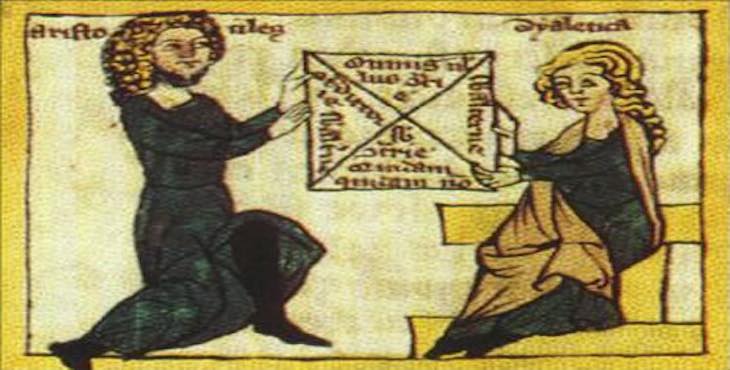Forking Paths
Samuel Kimpton-Nye on the philosophy and logic of what might have been

I imagined a labyrinth of labyrinths, a maze of mazes, a twisting, turning, ever-widening labyrinth that contained both past and future and somehow implied the stars.
—Borges, The Garden of Forking Paths
Your life could have been different, in all sorts of ways. You could have chosen a different breakfast cereal, outfit, career, partner, or place to live. The decisions you make settle which of many possible paths your life will take. But just how many possibilities are open to you? Could you have been a rock star? A ballet dancer? President of the USA?
Perhaps you think you couldn’t have been a rock star because you don’t like rock music, or that you lack the strength and coordination to be a ballet dancer. But you could have acquired a taste for rock music and with the right training, you could have developed the attributes of a ballet dancer. Perhaps you think you couldn’t have been president of the USA because you weren’t born in the USA. But you could have been born in the USA, had your parents lived there, so you really could have been president.
How far do the bounds of possibility extend? Could you make headlines by running a three-minute mile? The scientific evidence suggests that actual human biology makes running a three-minute mile impossible. However, human evolution itself could have taken a different path.
Could you run a mile in three microseconds (0.000003 seconds)? This would mean travelling faster than the speed of light, which would violate a law of nature. But perhaps the laws of nature could have been different. Now things are getting more controversial, and philosophers and scientists will disagree on whether the laws of nature really could have been different, in any sense.
Could you make your fortune in the art world by drawing a round square? M. C. Escher depicted all sorts of seemingly impossible objects, so why not? But we are yet to see a round square depicted artistically (I’m not convinced that this counts). You’d be forgiven for thinking that there really is no sense in which it is possible to draw a round square. And certainly, no matter how hard you tried or how the history of the world had been different, you couldn’t make it the case that two plus two equals five (though this can get complicated!). While the possibilities may extend further than you first thought (you really could have been president after all!), they do have their limits.
Philosophers take special interest in possibility, in this widest sense. Philosophers are also interested in related notions such as necessity (‘it is necessary that 2 + 2 = 4’) and contingency (‘it is only contingent that I am not president because I could have been president’). Possibility, necessity, and contingency are often categorized under the heading ‘modality’.
There are two particularly important philosophical questions about modality. First, what makes modal statements—statements about what’s possible, necessary, and so on—true? Second, how should we reason with modal statements?
Consider the first question. What makes ‘it is possible that you became president of the USA’ true? Perhaps you are the current president of the USA, in which case, thank you for taking some time out of your busy Twitter schedule to read this essay! If you are the current president of the USA, then it is possible that you became president of the USA because you actually did become president. Actuality implies possibility (more on this in a moment). But assuming you are not the current president, or a past president, what makes it true that you could have become president?
This is where philosophers have typically appealed to ‘possible worlds’ (most trace the notion back to Leibniz). The idea is that besides the actual world that we inhabit (not just the planet Earth but the entire universe), there are other worlds in which every possible alternative scenario is played out. It is true that you could have become president, then, because there is some world in which you are president!
What are possible worlds? The pre-eminent twentieth-century philosopher David Lewis famously argued that they are other concrete universes, just like the universe we inhabit. So, according to Lewis, every way things could possibly be is the way that some world is. But Lewis’s view of possible worlds is met with incredulity by the majority of contemporary philosophers, most of whom would rather think of possible worlds as ‘abstract objects’ rather than concrete parallel universes.
Possible worlds understood as abstract objects are then said to ‘represent’ alternative possibilities: for every way the world could have been, there is an abstract representation in which the world is that way. But what are these abstract possible worlds and how do they represent alternative possibilities? These are difficult questions indeed, questions to which some think there are just no good answers.
Recently, philosophers such as Barbara Vetter have taken a more down-to-earth approach to this first question and suggested rooting possibility firmly in the concrete (as opposed to abstract) objects of this world. It is possible that the glass on my desk breaks. But this is not because it breaks in some possible world; it is because of something about the glass itself, namely, the fact that the glass is fragile. Fragility is a ‘potentiality’ of the glass, a potentiality to break. It is this potentiality that makes it true that it is possible that the glass breaks. Similarly, the possibility that you became president is rooted in your potentialities, not some fact about what goes on at some other possible world. I think that this down-to-earth approach is the right one.
What about the second question? How should we reason about modality? Logic is the study of how to reason and philosophers of logic are interested in the rules that ensure good reasoning. Modal logic is concerned with a particular set of these rules: those for reasoning about what is possible and about what is necessary. Remember above I said that if you are actually president, it follows that it is possible that you became president. This is an instance of a general rule of modal logic, namely, anything that is actually the case is possibly the case.
Some rules of modal logic are a little more complex. For example, many philosophers think that if it is possible that you became president, then it is necessarily possible that you became president. In general, anything that is possibly the case is necessarily possibly the case—philosophers call this rule of modal logic the ‘5 Axiom’.
Recall that the type of possibility that interests philosophers is possibility in the widest sense, the sense not affected by contingencies such as birthplace. So, if you were born outside of the USA it doesn’t mean that it is not possible for you to be president, in the widest sense of ‘possible’, because you could have been born in the USA. This is to say that if something is possible in the widest sense, then whatever actually happened to be the case, it would still be possible—it is necessarily possible. This is just what the 5 Axiom tells us. So, it is because philosophers are interested in this wide sense of possibility that they find the 5 Axiom to be an attractive rule for reasoning about possibility.
Let’s briefly take stock. I have suggested that modal statements are made true by the potentialities of familiar things in the universe rather than by possible worlds—the down-to-earth approach. And I have suggested that when reasoning about possibility, if we know that something is possible, then we can infer that it is necessarily possible—the 5 Axiom.
But to carry out our due diligence when thinking about the philosophy of what might have been, we must now ask: Are the down-to-earth approach and the 5 Axiom consistent with one another? In other words, can it be the case both that modal statements are made true by the potentialities of things and that if something is possible, then it is necessarily possible? At first glance, it looks like we have a problem.
While we might agree that it’s possible that you became president even though you were born in France, what if you’d never be born at all? Perhaps your parents never met. They had a potentiality to never meet; and if they never met, you wouldn’t have existed. And if you didn’t exist, there would be no you to have the potentiality to be president. Recall that the down-to-earth approach understand possibility in terms of potentiality. So it follows that it wouldn’t be possible for you to be president in this scenario. It looks as though you being president is possible, but it is not necessarily possible. The upshot of all of this is that if we adopt the down-to-earth approach, then the 5 Axiom—if something is possible, then it is necessarily possible—cannot be a logical law because we have found a counterexample to it.
I argue, however, that this is too quick: it is true that if you didn’t exist, there would be no potentiality for you to be president, but it doesn’t follow from this that it is not necessarily possible that you were president. If we are resolute in our rejection of possible worlds, and given certain further assumptions about existence and the beginning of the universe, the down-to-earth approach and the 5 Axiom can coexist. The further assumptions I have in mind are the following:
· Whatever existed at the first moment of the universe exists necessarily and has all of its potentialities necessarily.
· All potentialities are derivative of the potentialities of this first thing that exists necessarily.
These assumptions are quite plausible given certain considerations from the science of cosmology, as well as the sensible starting position that modality concerns physical things in the actual world, rather than abstract objects or other possible worlds.
From these assumptions it follows that nothing has a potentiality for it to be the case that nothing ever had a potentiality for you to be president. In other words, whatever the case may have been, there would always have been a potentiality for you to be president—there couldn’t have failed to be a potentiality for you to be president—et voilà, it turns out that it is necessarily possible that you were president!
From considerations of how things might have been, in the widest sense, and of how best to reason about how things might have been, we are led to the conclusion that whatever existed at the first moment of the universe exists necessarily and that the potentialities of all other things are derivative of this first, necessarily existing thing. And so although it is possible that you are not a US citizen, and it is possible that you were never been born, it is necessarily possible that you became the president. I leave it to others to argue about the significance of this conclusion!

The Source Code
This essay is based on the article ‘Can Hardcore Actualism Validate S5?’, by Samuel Kimpton-Nye, published in Philosophy and Phenomenological Research.





